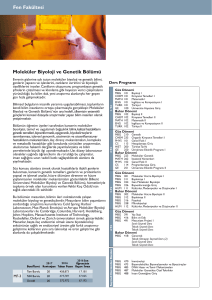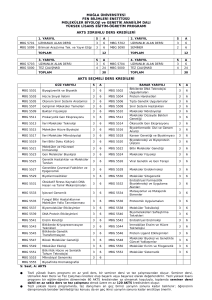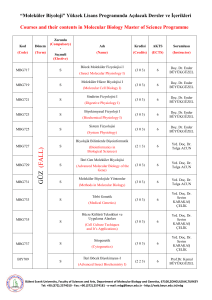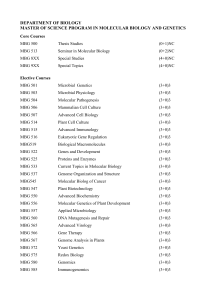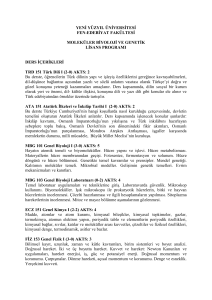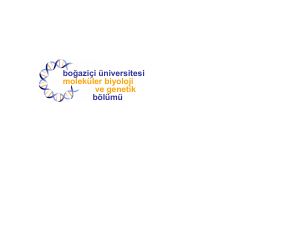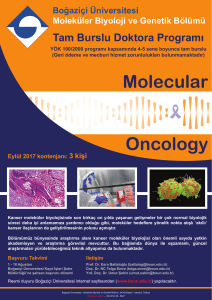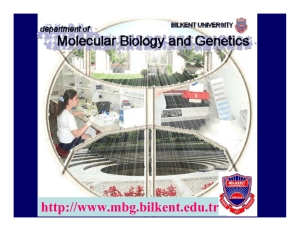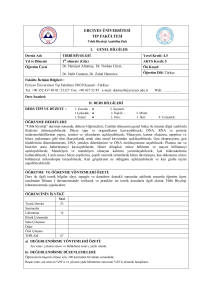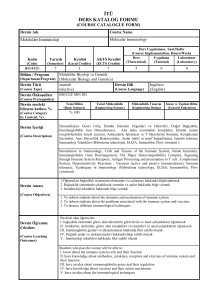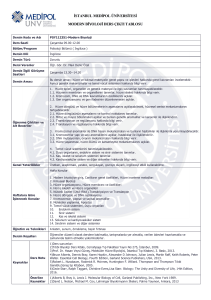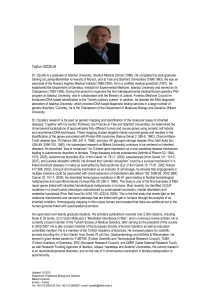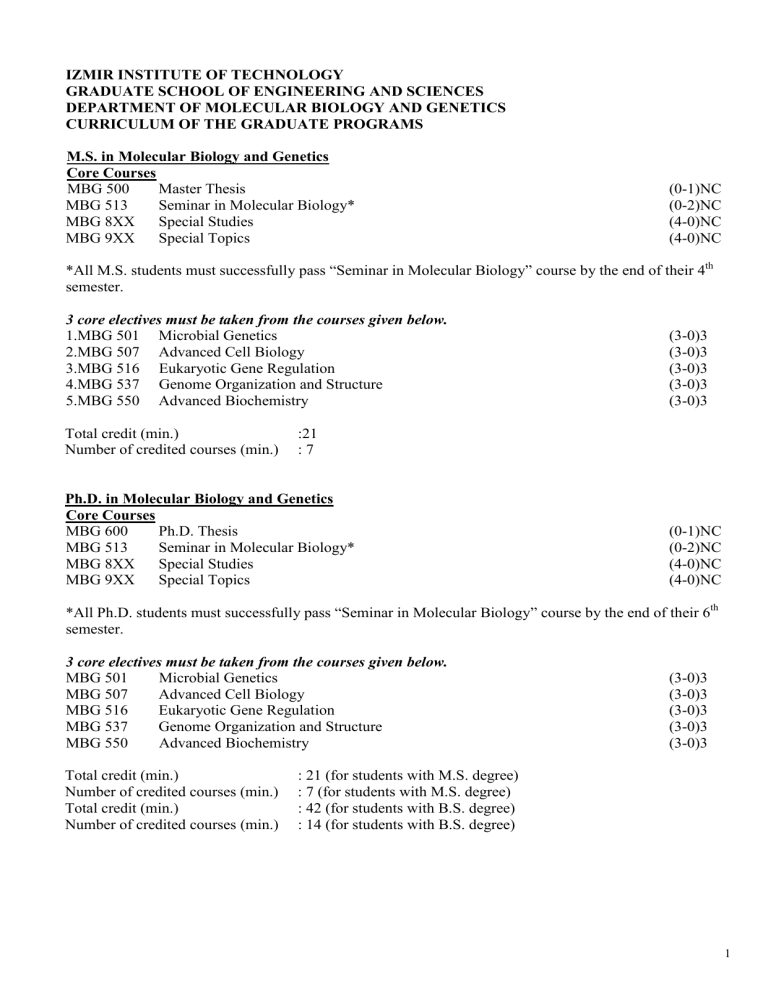
IZMIR INSTITUTE OF TECHNOLOGY
GRADUATE SCHOOL OF ENGINEERING AND SCIENCES
DEPARTMENT OF MOLECULAR BIOLOGY AND GENETICS
CURRICULUM OF THE GRADUATE PROGRAMS
M.S. in Molecular Biology and Genetics
Core Courses
MBG 500
Master Thesis
MBG 513
Seminar in Molecular Biology*
MBG 8XX
Special Studies
MBG 9XX
Special Topics
(0-1)NC
(0-2)NC
(4-0)NC
(4-0)NC
*All M.S. students must successfully pass “Seminar in Molecular Biology” course by the end of their 4th
semester.
3 core electives must be taken from the courses given below.
1.MBG 501 Microbial Genetics
2.MBG 507 Advanced Cell Biology
3.MBG 516 Eukaryotic Gene Regulation
4.MBG 537 Genome Organization and Structure
5.MBG 550 Advanced Biochemistry
Total credit (min.)
Number of credited courses (min.)
(3-0)3
(3-0)3
(3-0)3
(3-0)3
(3-0)3
:21
:7
Ph.D. in Molecular Biology and Genetics
Core Courses
MBG 600
Ph.D. Thesis
MBG 513
Seminar in Molecular Biology*
MBG 8XX
Special Studies
MBG 9XX
Special Topics
(0-1)NC
(0-2)NC
(4-0)NC
(4-0)NC
*All Ph.D. students must successfully pass “Seminar in Molecular Biology” course by the end of their 6th
semester.
3 core electives must be taken from the courses given below.
MBG 501
Microbial Genetics
MBG 507
Advanced Cell Biology
MBG 516
Eukaryotic Gene Regulation
MBG 537
Genome Organization and Structure
MBG 550
Advanced Biochemistry
Total credit (min.)
Number of credited courses (min.)
Total credit (min.)
Number of credited courses (min.)
(3-0)3
(3-0)3
(3-0)3
(3-0)3
(3-0)3
: 21 (for students with M.S. degree)
: 7 (for students with M.S. degree)
: 42 (for students with B.S. degree)
: 14 (for students with B.S. degree)
1
IZMIR INSTITUTE OF TECHNOLOGY
GRADUATE SCHOOL OF ENGINEERING AND SCIENCES
DEPARTMENT OF MOLECULAR BIOLOGY
CURRICULUM OF THE GRADUATE PROGRAMS
Elective Courses
MBG 502
MBG 503
MBG 504
MBG 505
MBG 506
MBG 514
MBG 515
MBG 517
MBG 519
MBG 522
MBG 525
MBG 533
MBG 545
MBG 546
MBG 547
MBG 556
MBG 557
MBG 560
MBG 565
MBG 566
MBG 567
MBG 568
MBG 570
MBG 572
MBG 575
MBG 580
MBG 581
MBG 583
MBG 584
MBG 585
Molecular and Cellular Biophysics
Microbial Physiology
Molecular Pathogenesis
Cell Physiology
Mammalian Cell Culture
Plant Cell Culture
Advanced Immunology
Algorithms in Bioinformatics
Biological Macromolecules
Genes and Development
Proteins and Enzymes
Current Topics in Molecular Biology
Molecular Biology of Cancer
The Biology of Metastasis
Plant Biotechnology
Molecular Genetics of Plant Development
Applied Microbiology
DNA Mutagenesis and Repair
Advanced Virology
Gene Therapy
Genome Analysis in Plants
Current Topics in Plant Molecular Genetics
Advanced Genetics
Yeast Genetics
Redox Biology
Genomics
Data Analysis in Mass Spectrometry Driven
Animal Models in Medical Research
Current Topics in Medical Genetics
Immunogenomics
(3-0)3
(3-0)3
(3-0)3
(3-0)3
(3-0)3
(3-0)3
(3-0)3
(3-0)3
(3-0)3
(3-0)3
(3-0)3
(3-0)3
(3-0)3
(3-0)3
(3-0)3
(3-0)3
(3-0)3
(3-0)3
(3-0)3
(3-0)3
(3-0)3
(3-0)3
(3-0)3
(3-0)3
(3-0)3
(3-0)3
(3-0)3
(3-0)3
(3-0)3
(3-0)3
2
ĠZMĠR INSTITUTE OF TECHNOLOGY
GRADUATE SCHOOL OF ENGINEERING AND SCIENCES
DEPARTMENT OF MOLECULAR BIOLOGY AND GENETICS
CURRICULUM OF THE GRADUATE PROGRAMS
COURSE DESCRIPTIONS
MBG 500 Thesis Studies
(0-1)NC
Program of research leading to M.S. degree arranged between student and a faculty member. Students
register to this course in all semesters starting from the beginning of their second semester.
MBG 501 Microbial Genetics
(3-0)3
Genetic phenomena, gene transfer, recombination, gene fusion and modern concepts in the genetics of
microorganisms.
MBG 502 Molecular and Cellular Biophysics
(3-0)3
Protein and cell structure and dynamics, biophysical forces, thermodynamics, membranes, enzymes.
MBG 503 Microbial Physiology
Modern concepts in physiology and structure of microorganisms.
(3-0)3
MBG 504 Molecular Pathogenesis
(3-0)3
This course includes the subjects of general molecular principles of microbial pathogenesis, adhesion and
invasion strategies, intracellular survival strategies, epidemiology, virulence factors, antibiotic resistance,
bacterial toxins, fungal pathogenesis, parasite pathogenesis, biofilms, and quorum sensing. Most of the
emphasis will be on bacterial pathogens of mammals and plants, but there will be some discussion of viral
and protozoan pathogens.
MBG 505 Cell Physiology
(3-0)3
The course will initially introduce basic cell structure and function in mammalian cells. Then, it will focus
on the properties of cell membrane. This will be followed by cell-cell and also cell-ECM interactions.
After the introduction of electrical properties of membranes, special systems e.g. nervous and muscular,
will be covered. The course will finish with an overview of the semester
MBG 506 Mammalian Cell Culture
(3-0)3
An overview of animal cell culture methodology. Recent research in quantitative cell biology as well as
studies with tissues and cells of higher organisms cultured in vitro.
MBG 507 Advanced Cell Biology
(3-0)3
The main objective of this course is to introduce all the components of the animal eukaryotic cells
including plasma membrane structure and functions, nucleus, protein sorting and transport, energy
conversion, cell cycle and apoptosis.
MBG 513 Seminar in Molecular Biology
(0-2)NC
A seminar about a research subject will be presented by each student. Departmental seminars must be
attended by students.
MBG 514 Plant Cell Culture
(3-0)3
An overview of plant cell culture, principles and techniques for the genetic manipulation of cultured plant
cells.
3
MBG 515 Advanced Immunology
Discussion of the modern concepts in immunology. Emphasis on areas of current interest.
(3-0)3
MBG 516 Eukaryotic Gene Regulation
(3-0)3
Structure, synthesis and biochemical properties of nucleic acids, protein biosynthesis, control of gene
expression and molecular genetics
MBG 517 Algorithms in Bioinformatics
(3-0)3
This course is a follow-up course for Bioinformatics and will introduce students to algorithmic Algorithms
used in various areas of biological research, sequence alignment, pattern matching, and distance
calculations for various topics, some of the algorithms will be implemented into working software.
MBG 519 Biological Macromolecules
(3-0)3
Physical/chemical theory and techniques with emphasis on proteins and nucleic acids, solutions,
chromatography, electrophoresis, viscosity, diffusion, sedimentation, spectroscopy, and isotopes.
MBG 520 Conformation of Biomolecules and Biophysical Methods
(3-0)3
This course includes biophysical chemistry, structure of proteins, structure of nucleic acids, other
biological molecules, the forces determining protein and nucleic acid structure and conformational
analysis, absorption spectroscopy, other optical methods, introduction to magnetic resonance, the structure
and shape of macromolecules, ultracentrifuge, other hydrodynamic techniques and X-ray crystallography.
MBG 522 Genes and Development
(3-0)3
Introducing knowledge of genetics and developmental biology of model organism such as C. elegans, D.
melanogaster, Mus musculus.
MBG 525 Proteins and Enzymes
(3-0)3
Properties of proteins and polypeptides. Structural analysis and molecular interactions, enzyme structure,
kinetic mechanisms and control.
MBG 533 Current Topics in Molecular Biology
Special topics in molecular and cell biology.
(3-0)3
MBG 537 Genome Organization and Structure
(3-0)3
The class will cover the structure and variation of nuclear genomes including changes in genome size,
centromere and telomere structure, DNA packaging, transposable elements, DNA methylation, mutations
(point, translocations, inversions, deletions, duplications), genomic sequencing, and comparative and
functional genomics.
MBG 545 Molecular Biology of Cancer
(3-0)3
Studies on cellular and molecular mechanisms of cancers with emphasis on current literature in cancer
research.
MBG 546 The Biology of Metastasis
(3-0)3
The course will focus on the molecular mechanisms involved in metastatic course, invasion, leaving the
primary tumor, surviving the circulation and finally settling and growing in a distant organ. Experimental
systems used to study metastasis will be introduced and discussed in the context of the recent research
papers.
4
MBG 547 Plant Biotechnology
(3-0)3
Discussion of genetic transformation methodologies, gene expression systems and analysis techniques will
provide a foundation for study of current research in the area of plant genetic engineering and
biotechnology. The uses of genetic engineering including strategies for obtaining transgenic plants that are
resistant to insects, diseases and herbicides, that produce useful products or have improved health,
nutritional or food processing characteristics will be discussed. Regulatory and social issues related to
plant biotechnology will also be addressed.
MBG 550 Advanced Biochemistry
(3-0)3
Chemistry of carbohydrates, lipids and membranes. Biosynthesis and metabolism of nucleic acids. Protein
function and evolution.
MBG 556 Molecular Genetics of Plant Development
(3-0)3
Topics will include cell lineages and positional information, embryogenesis, seedling, shoot, leaf, root,
flower, fruit and seed development, the transition to flowering and pollination
MBG 557 Applied Microbiology
(3-0)3
The first section aims to explain why development of the new strains is necessary in the exploitation of
biodiversity and relevant strategies. In the second section, construction and the use of environmental DNA
libraries are covered. In the final section, laboratory evolution studies are introduced.
MBG 560 DNA Mutagenesis and Repair
(3-0)3
Action of physical and chemical environmental agents on genetic material. DNA repair. Mutagenic and
carcinogenic consequences.
MBG 565 Advanced Virology
(3-0)3
A general view of the multiplication strategies of viruses, their interactions with the host and immune
response to viruses.
MBG 566 Gene Therapy
(3-0)3
Gene therapy is the attempt to replace a defective gene which causes disease with a good copy. The overall
purpose of gene therapy course is to expose student to a comprehensive and detailed overview of the whole
field of gene therapy, ranging from vector development to the results of the most recent clinical trials. In
this course, currently employed methods, successes and ongoing trials, challenges and future approaches
will also be introduced. Gene and cell therapies for neurologic and metabolic diseases will be mainly
discussed. Therefore, the knowledge of the molecular pathology of genetic diseases is required to take this
course.
MBG 567 Genome Analysis in Plants
(3-0)3
The application of DNA markers to the identification, manipulation and isolation of genes important to
plant productivity will be discussed.
MBG 568 Current Topics in Plant Molecular Genetics
Special topics in plant molecular genetics.
(3-0)3
MBG 570 Advanced Genetics
(3-0)3
The course covers will cover five main topics linkage and mapping, non-Mendelian inheritance,
chromosomal phenomena, mutation and screening and meiosis.
5
MBG 572 Yeast Genetics
(3-0)3
Yeast cell biology, metabolism, genome and genomics, gene manipulations, complementations and
mutagenesis
MBG 575 Redox Biology
(3-0)3
Free radicals, antioxidants, oxidative damage to biomolecules, repair mechanisms, redox control of gene
expression, redox signaling
MBG 580 Genomics
(3-0)3
Genome structure and organization, sequencing genomes, micro array and chip technology, genome-wide
genotyping, functional genomics, arrays, metabolomics and proteomics topics will be included.
MBG 581 Data Analysis in Mass Spectrometry Driven Proteomics
(3-0)3
Mass spectrometry is currently the tool of choice in many areas of proteomics. For successful studies a
thorough understanding of mass spectrometry is important. It is furthermore crucial to have a clear
appreciation of algorithms and statistics used to infer knowledge from mass spectrometry. This course will
review important aspects of mass spectrometry and will detail several algorithms and statistical measures
in proteomics with mass spectrometry. Students will be able to analyze limited mass spectrometric
experiments after taking this course.
MBG583 Animal Models in Medical Research
(3-0)3
Animal models are extensively used to study in vivo gene function as well as to model human diseases.
The generation of animal models permits the evaluation of therapeutic strategies in models of human
disease as well as the investigation of disease progression in a manner not possible in human subjects. The
technology for producing transgenic animal models and the utilization of these models for medical
research in different diseases will be mainly discussed. Beside mammalian, non mammalian organism used
in genetic diseases research will be also introduced.
MBG 584 Current Topics in Medical Genetics
Recent developments in the field of medical genetics will be introduced and discussed.
(3-0)3
MBG 585 Immunogenomics
(3-0)3
The main objective of this graduate level course is to teach students genome-wide approaches on immune
system, immune response and molecular mechanisms of diseases
MBG 8XX Special Studies
(4-0)NC
M.S. and Ph.D. students choose and study a topic under the guidance of a faculty member normally his/her
advisor.
MBG 9XX Special Topics
(4-0)NC
Graduate students as a group or a PhD student chooses and studies advanced topics under the guidance of a
faculty member normally his/her advisor.
6
ĠZMĠR YÜKSEK TEKNOLOJĠ ENSTĠTÜSÜ
MÜHENDĠSLĠK VE FEN BĠLĠMLERĠ ENSTĠTÜSÜ
MOLEKÜLER BĠYOLOJĠ VE GENETĠK ANABĠLĠM DALI
LĠSANSÜSTÜ PROGRAMLARINA AĠT EĞĠTĠM PLANI
Moleküler Biyoloji ve Genetik Yüksek Lisans
Zorunlu Dersler
MBG 500
Yüksek Lisans Tezi
MBG 513
Moleküler Biyolojide Seminer*
MBG 8XX
Uzmanlık Alanı Dersi
MBG 9XX
Uzmanlık Alanı Dersi
(0-1)Kredisiz
(0-2)Kredisiz
(4-0)Kredisiz
(4-0)Kredisiz
*Bütün Yüksek Lisans öğrencileri “Moleküler Biyolojide Seminer” dersini ilk 4 yarıyıl içerisinde başarıyla
geçmek zorundadır.
Aşağıda verilen derslerden üçünün alınması zorunludur.
1.MBG 501 Mikrobiyal Genetik
2.MBG 507 İleri Hücre Biyolojisi
3.MBG 516 Ökaryotik Gen Regülasyonu
4.MBG 537 Genome Organizasyonu ve Yapısı
5.MBG 550 İleri Biyokimya
Toplam Kredi (en az)
Kredili Ders Sayısı (en az)
(3-0)3
(3-0)3
(3-0)3
(3-0)3
(3-0)3
:21
:7
Moleküler Biyoloji ve Genetik
Zorunlu Dersler
MBG 600
Doktora Tezi
MBG 513
Moleküler Biyolojide Seminer*
MBG 8XX
Uzmanlık Alanı Dersi
MBG 9XX
Uzmanlık Alanı Dersi
(0-1)Kredisiz
(0-2)Kredisiz
(4-0)Kredisiz
(4-0)Kredisiz
*Doktora programına kabul edilmiş bütün öğrenciler “Moleküler Biyolojide Seminer” dersini ilk 6 yarıyıl
içerisinde başarıyla geçmek zorundadır.
Aşağıda verilen derslerden üçünün alınması zorunludur.
1.MBG 501 Mikrobiyal Genetik
2.MBG 507 İleri Hücre Biyolojisi
3.MBG 516 Ökaryotik Gen Regülasyonu
4.MBG 537 Genom Organizasyonu ve Yapısı
5.MBG 550 İleri Biyokimya
Toplam Kredi (en az)
Kredili Ders Sayısı (en az)
Toplam Kredi (en az)
Kredili Ders Sayısı (en az)
(3-0)3
(3-0)3
(3-0)3
(3-0)3
(3-0)3
: 21 (Yüksek Lisans derecesine sahip öğrenciler için)
: 7 (Yüksek Lisans derecesine sahip öğrenciler için)
: 42 (Lisans derecesine sahip öğrenciler için)
: 14 (Lisans derecesine sahip öğrenciler için)
7
ĠZMĠR YÜKSEK TEKNOLOJĠ ENSTĠTÜSÜ
MÜHENDĠSLĠK VE FEN BĠLĠMLERĠ ENSTĠTÜSÜ
MOLEKÜLER BĠYOLOJĠ VE GENETĠK ANABĠLĠM DALI
LĠSANSÜSTÜ PROGRAMLARINA AĠT EĞĠTĠM PLANI
Seçmeli Dersler
MBG 502
MBG 503
MBG 504
MBG 505
MBG 506
MBG 514
MBG 515
MBG 517
MBG 519
MBG 520
MBG 522
MBG 525
MBG 533
MBG 545
MBG 546
MBG 547
MBG 556
MBG 557
MBG 560
MBG 565
MBG 566
MBG 567
MBG 568
MBG 570
MBG 572
MBG 575
MBG 580
MBG 581
MBG 583
MBG 584
MBG 585
Moleküler ve Hücresel Biyofizik
Mikrobiyal Fizyoloji
Moleküler Patogenez
Hucre Fizyolojisi
Memeli Hücre Kültürü
Bitki Hücre Kültürü
İleri İmmunoloji
Biyoinformatikte Algoritmalar
Biyolojik Makromoleküller
Biyomoleküllerde Konformasyon ve Biyofiziksel Yöntemler
Genler ve Gelişim
Proteinler ve Enzimler
Moleküler Biyolojide Güncel Konular
Kanserin Moleküler Biyolojisi
Metastaz Biyolojisi
Bitki Biyoteknolojisi
Bitki Gelişiminin Moleküler Genetiği
Uygulamalı Mikrobiyoloji
DNA Mutagenezi ve Onarım
İleri Viroloji
Gen Terapisi
Bitkilerde Genom Analizi
Bitki Moleküler Genetiğinde Güncel Konular
İleri Genetik
Maya Genetiği
Redoks Biyolojisi
Genomik
Proteomik Kütle spektrometresinde Veri Analizleri
Tıbbi Araştırmalarda Hayvan Modelleri
Medikal Genetikte Güncel Konular
Immünogenomik
(3-0)3
(3-0)3
(3-0)3
(3-0)3
(3-0)3
(3-0)3
(3-0)3
(3-0)3
(3-0)3
(3-0)3
(3-0)3
(3-0)3
(3-0)3
(3-0)3
(3-0)3
(3-0)3
(3-0)3
(3-0)3
(3-0)3
(3-0)3
(3-0)3
(3-0)3
(3-0)3
(3-0)3
(3-0)3
(3-0)3
(3-0)3
(3-0)3
(3-0)3
(3-0)3
(3-0)3
8
ĠZMĠR YÜKSEK TEKNOLOJĠ ENSTĠTÜSÜ
MÜHENDĠSLĠK VE FEN BĠLĠMLERĠ ENSTĠTÜSÜ
MOLEKÜLER BĠYOLOJĠ VE GENETĠK ANABĠLĠM DALI
LĠSANSÜSTÜ PROGRAMLARINA AĠT EĞĠTĠM PLANI
DERS ĠÇERĠKLERĠ
MBG 500 Tez Çalışması
(0-1)Kredisiz
Öğretim üyesi ve öğrenci arasında organize edilen yüksek lisans derecesi almaya yönelik araştırma
programı. Öğrenciler ikinci sömestrin başından itibaren her sömestr bu derse kayıt olmak zorundadır.
MBG 501 Mikrobiyal Genetik
(3-0)3
Genetik fenomena, gen transfer, rekombinasyon, gen füzyonu ve mikroorganizmaların genetiğinde modern
kavramlar.
MBG 502 Molekuler ve Hucresel Biyofizik
Protein ve hucre yapisi ve hareketliligi, biyofiziksel kuvvetler, termodinamik, zarlar, enzimler.
(3-0)3
MBG 503 Mikrobiyal Fizyoloji
Mikroorganizmaların yapısı ve mikrobiyal fizyolojide modern kavramlar.
(3-0)3
MBG 504 Moleküler Patogenez
(3-0)3
Bu ders mikrobiyal patogenezin genel moleküler prensipler, adhezyon ve invazyon stratejileri, hücre
içindeki yaşam stratejileri, epidemiyoloji, virulans faktörleri, antibiyotik direnci, bakteriyal toksinler,
fungal patogenezi, parazit patogenezi, biyofilmler ve bakteriyal iletişim konularını içermektedir. Ağırlığın
çoğu bakteriyal hayvan ve bitki patojenleri olmakla birlikte, viral ve parazitik patojenlerde işlenecektir.
MBG 505 Hücre Fizyolojisi
(3-0)3
Ders giriş olarak memelilerdeki farklı hücre tipleri, yapı ve fonksiyonlarıyla başlayacaktır. Organeller
hakkında genel bilgiden sonra hücre zarı üzerine yoğunlaşılacaktır. Bu sırada zar proteinleri, zarın görevi,
hücrelerin birbirleriyle ve çevreleriyle olan ilişkileri tartışılacaktır. Ardından zarın elektriksel özellikleri ve
bu mekanizmaların özel sistemlerdeki (kas ve sinir) rolleri işlendikten sonra ders genel bir
değerlendirmeyle bitirilecek.
MBG 506 Memeli Hücre Kültürü
(3-0)3
Hayvan Hücre kültürü metodlarının gözden geçirimi. İnvitro kültürü yapılan yüksek organizmaların
hücreleriyle ve dokularıyla ilgili çalışmalar gibi kantitatif hücre biyolojisinde son araştırmalar.
MBG 507 Ġleri Hücre Biyolojisi
(3-0)3
Bu dersin esas amacı; plazma hücre zarının yapısı ve görev, çekirdek, protein sınıflandırması ve taşınması,
enerji dönüşümleri, hücre döngüsü ve apoptoz gibi ökaryotik hayvan hücresine ait bileşenleri tanıtmaktır.
MBG 513 Moleküler Biyolojide Seminer
(0-2)Kredisiz
Bölümde verilen seminerlere katılıp, belirlenen bir konuda hazırlanıp, seminer verilmesi.
MBG 514 Bitki Hücre Kültürü
(3-0)3
Bitki hücre tekniklerine genel bakış, kültürü yapılmış bitki hücrelerinin genetik manipülasyonu için
teknikler ve prensipler.
MBG 515 Ġleri Ġmmünoloji
(3-0)3
İmmünolojide modern kavramların tartışılması ve günümüzdeki ilgi alanları üzerinde yoğunlaşma.
9
MBG 516 Ökaryotik Gen Regulasyonu
(3-0)3
Nükleik asitlerin yapısı, sentezi ve biyokimyasal özellikleri. Protein biyosentezi. Gen ifadesinin kontrolü.
Moleküler genetik.
MBG 517 Biyoinformatikte Algoritmalar
(3-0)3
Biyolojinin çeşitli alanlarında kullanılan algoritmalar, dizi karşılaştırmaları, motif eşleşmeleri, çeşitli
biyolojik konularda homoloji belirleme çalışmaları, bazı algoritmalar yazılımlara uygulanacaktır.
MBG 519 Biyolojik Makromoleküller
(3-0)3
Nükleik asitler ve proteinler üzerinde fiziksel / kimyasal teori ve teknikler. Solüsyonlar, kromotografi,
elektroforez, vizkoziti, difüzyon, sedimentasyon ve izotoplar.
MBG 522 Genler ve Gelişim
(3-0)3
Caenorhabtidis elegans, Drosophila melanogaster ve Mus musculus gibi model organizmaların genetik ve
gelişimleri ile bilgilerin verilmesi.
MBG 525 Proteinler ve Enzimler
(3-0)3
Polipeptidlerin ve proteinlerin özellikleri, yapısal analizler ve moleküler etkileşimleri. Enzimlerin yapısı,
kinetik mekanizmaları ve kontrolü.
MBG 533 Moleküler Biyolojide Güncel Konular
Moleküler ve hücre biyolojisinde özel konular.
(3-0)3
MBG 537 Genom Organizasyonu ve Yapısı
(3-0)3
Bu ders ökaryotik genom yapısı ve çeşitliliğini kapsamaktadır. İncelenecek konular arasında genom
büyüklüğündeki değişimler, sentromer ve telomer yapısı, DNA paketlenmesi, transpozonlar, DNA
metilasyonu, mutasyonlar, genom dizileme, karşılaştırmalı ve fonksiyonel genom analizleri bulunmaktadır.
MBG 545 Kanserin Moleküler Biyolojisi
(3-0)3
Kanserin hücresel ve genetik mekanizmalarını ve kanser araştırmaları üzerinde yayınlanan güncel
literatürü irdelemek.
MBG 546 Metastaz Biyolojisi
(3-0)3
Metastaz sürecinin belli başlı basamaklarında (invazyon, primer tümörden ayrılma, dolaşımı geçip uzak bir
organda büyüme) rol oynayan moleküler mekanizmalar incelenecektir. Metastaz çalışmalarında kullanılan
deneysel yöntemler üzerinde de durulup güncel araştırma makaleleri çerçevesinde tartışılacaktır.
MBG 547 Bitki Biyoteknolojisi
(3-0)3
Genetik transformasyon metotları, gen ekspresyon sistemleri ve analiz tekniklerini içeren tartışma konuları
bitki genetik mühendisliği ve biyoteknolojisi alanı için bir temel oluşturacaktır. Genetik mühendisliği
kullanım alanları arasında böcek ve hastalıklarına dirençlilik, sağlık ve beslenme ile ilgili karakterlerin
iyileştirilmesi sayılabilir. Ayrıca bitki genetik mühendisliği ile ilgili kontrol ve sosyal konular
tartışılacaktır.
MBG 550 Ġleri Biyokimya
(3-0)3
Membranların, yağların ve karbonhidratların kimyası. Nükleik asitlerin biyosentezi ve metabolizması.
Protein fonksiyonu ve evrim.
MBG 556 Bitki Gelişiminin Moleküler Genetiği
(3-0)3
Embriyo, fide, yaprak, kök, çiçek, meyve, tohum büyüme ve gelişmesi ile birlikte çiçeklenmeden
tozlaşmaya geçiş süresi konuları işlenecektir.
10
MBG 557 Uygulamalı Mikrobiyoloji
(3-0)3
Birinci bölüm biyoçeşitlilikten yararlanmak için niçin yeni bakteriyel suşların geliştirilmesi gerektiğini
açıklamayı amaçlamaktadır. İkinci bölüm çevresel DNA kütüphanelerinin yapımı ve kullanımı konularını
kapsamaktadır. Son bölümde laboratuarda evrim çalışmaları tanıtılmaktadır.
MBG 560 DNA Mutagenezi ve Onarım
(3-0)3
Fiziksel ve kimyasal çevre faktörlerinin genetik materyal üzerindeki etkileri. DNA onarım mekanizmaları.
Mutajenik ve karsinojenik sonuçlar.
MBG 565 Ġleri Viroloji
(3-0)3
Virüslerin çoğalma stratejilerine, hücreyle olan ilişkilerine ve bağışıklık sisteminin virüslere karşı tepkisine
genel bir bakış. Patolojik açıdan önemli virüslerin moleküler düzeyde derinlemesine incelenmesi.
MBG 566 Gen Terapisi
(3-0)3
Gen tedavisi hastalığa neden olan arızalı genin sağlam kopyası ile değistirilmesi çalışmasıdır. Bu dersin
genel amacı öğrencilere vector geliştirilmesinden en son uygulamalanan klinik çalışmalara kadar uzanan
genis bir yelpazede gen tedavisinin hemen tüm alanlarında ayrıntılı ve açıklayıcı bilgilerin verilmesidir. Bu
derste son yıllarda kullanılan metodlar, devam eden klinik denemelerin sonucları ve gelecekteki
uygulamalar anlatılacaktır. Őzellikle nörolojik ve metabolik hastalıklardaki gen ve hücre tedavisi
tartışılacaktır o nedenle genetik hastalıkların moleküler patolojisi hakkında bilgi sahibi olunması dersi
almak için aranan niteliktir.
MBG 567 Bitkilerde Genom Analizi
(3-0)3
DNA işaretleyicilerinin bitki verimliliğinde önemli genlerin belirlenmesi ve klonlanması ile ilgili
uygulamaları tartışılacaktır.
MBG 568 Bitki Moleküler Genetiğinde Güncel Konular
Bitki moleküler genetiğindeki son gelişmeler tartışılacaktır.
(3-0)3
MBG 570 Ġleri Genetik
(3-0)3
Genetik bağlantı ve haritalama, non-Mendelian kalıtım, kromozomal olaylar, mutasyon ve surveylenmesi
ve Mayoz Bölünme gibi önemli konular tartışılacaktır.
MBG 572 Maya Genetiği
(3-0)3
Maya hücre biyolojisi, metabolizması, genom ve genomiği, gen manipülasyonu, komplementasyonu,
mutant hücre izolasyonu.
MBG 575 Redoks Biyolojisi
(3-0)3
Serbest radikaller, biyomoleküllerin oksitlenmesi ve tamiri, antioksidanlar, gen ifadelenmesinin redoks
kontrolü, redoks sinyal iletimi.
MBG 580 Genomik
(3-0)3
Genom yapısı ve organizasyonu, genom sekanslama, mikroarray ve çip teknolojisi, genom seviyesinde
genotipleme, fonksiyonel genomik, array çeşitleri, metabolomiks ve proteomiks konuları işlenecektir.
11
MBG 581 Proteomik Kütle spektrometresinde Veri Analizleri
(3-0)3
Kütle spektrometresi şu anda proteomic çalışmalarının pek çok alanda tercih edilen bir araçtır. Başarılı
çalışmalar için kütle spektrometresini anlamak çok önemlidir. Kütle spektrometresinden geliştirilen
bilgilerin doğru yorumlanması için gerekli olan algoritmaların ve istatistiğin açık bir şekilde anlaşılması
gereklidir. Bu ders ile kütle spektrometresinin önemli yönleri gözden geçirilecek ve kütle spektrometresi
ile yapılan proteomik analizlerde çeşitli algoritmalar ve istatistik ölçümler detaylandıracaktır. Öğrenciler
bu dersi aldıktan sonra sınırlı düzeyde kitle spektrometrik ile ilgili deney sonuçlarını analiz edebilecektir.
MBG 583 Tıbbi Araştırmalarda Hayvan Modelleri
(3-0)3
Hayvan modelleri in vivo gen fonksiyonu ve düzenlenmesi çalışmalarının yanısıra hastalık modelleri
olarakta sıklıkla kullanılmaktadırlar. Hayvan modellerinin yaratılması insanların model olarak
kullanılamayacagı tedavi stratejilerinin geliştirilmesi ve değerlendirilebilmesine olanak saglamaktadır. Bu
derste transgenik hayvan modellerinin üretilme teknolojisi ve bu hayvanların farklı hastalıkların
araştırılmasındaki kullanımı ağırlıklı olarak tartışılacaktır. Memelilerin yanısıra genetik hastalık
araştırmalarında kullanılan memeli olmayan diğer model organizmalarda tanıtılacaktır.
MBG 584 Medikal Genetikte Güncel Konular
Medikal genetik konularında yayınlanan son çalışmalar tanıtılacak ve tartışılacaktır.
(3-0)3
MBG 585 Ġmmünogenomik
(3-0)3
Bu dersin amacı, yüksek lisans öğrencilerine, genomik perspektif açıdan immün sistemin, immün yanıtın
ve hastalıkların moleküler mekanizmalarının öğretilmesidir.
MBG 8XX Uzmanlık Alanı Dersi
(4-0)Kredisiz
Yüksek lisans öğrencileri belli bir konu seçip genelinde kendi tez danışmanları olan bir öğretim üyesinin
yönlendirmesi ile o konuyu inceler.
MBG 9XX Uzmanlık Alanı Dersi
(4-0)Kredisiz
Lisansüstü öğrencileri bir grup halinde yada bir doktora öğrencisinin ileri araştırma konuları seçip
genelinde kendi tez danışmanları olan bir öğretim üyesinin yönlendirmesi ile seçilen konuları inceler.
12

